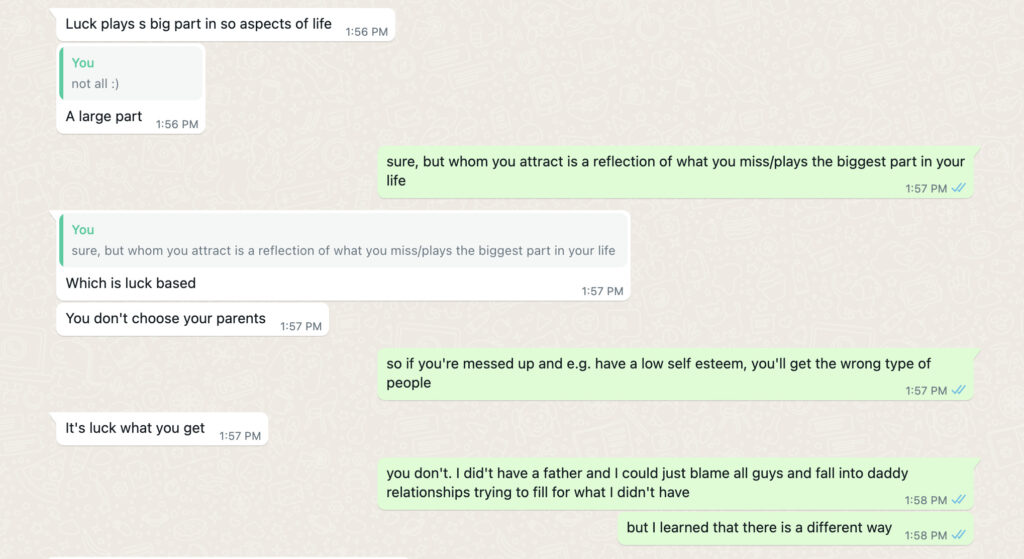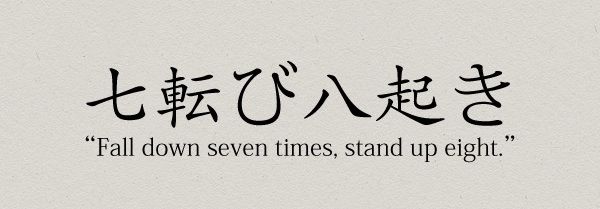I have a friend who blames everything on luck, or lack thereof.

Despite being extremely successful at work, he has this fixed mindset that prevents him from creating chances to meet a partner he desires.
Am I naive thinking that we have a power over our own destiny and that you can attract luck? Is it just my millenial, individualistic fantasy, that has been ingrained in me (and many like me) with the American Hollywood movies and startup “success stories”?
Well… maybe, but since everyone’s world is just a projection of their mind, my world mirrored mine back, making me feel pretty lucky. I have been surrounded by good willing people (those bad apples quickly were spotted and discarded) and plenty of opportunities.
Yet, afar, I’ve seen my high school friends from my small hometown (but not a village :), whose worldview differs much from mine. Some of them stayed where they started, not many dared to face the scary, unknown world, and many of them rendered unhappy – some are already divorced, some ended up in low paying jobs etc. And we all started from pretty much the same level – living in a 50k population town by the sea side, raised in middle class families, parents with communist Boomer mindset, where saving and risk avoiding was everything.
It all made me start to wonder what makes some people luckier than others.
I know that for each person luck may mean something else. For me, it’s this feeling of knowing what you want from life and getting it in multifold, both professionally and personally.
And maybe some things took me much longer to realise, than I would have hoped, I always took this as a positive lesson. I know that I haven’t leaned out enough to reach the level of “luck” others “get”. The world (of success) favours the bold, the quirky polymath ones, that define their own niche and self-label.
I still fight internal demons of comparing my today’s self to tomorrow’s established originals and well-respected business people. Holding myself back. I’ve been questioning my ideas too much instead of just making a decision, executing on them and analysing the outcome – and if needed, adjusting on the fly.
Knowing the problem is half the battle, so I know I will get what I desire, eventually.
Hi, I’m Kamila. What’s your name?
So what makes some people attract more of the good stuff, while others seem to miss out? Richard Wiseman, a psychology professor at the University of Hartfordshire, has been studying how luck plays a role in our lives. He wanted to see how chance opportunities come about and their impact on our lives. He examined the difference between self-professed lucky and unlucky people.
Unsurprisingly, the professor found that lucky people score significantly higher on extroversion. They smile twice as often, and engage in more eye contact. Their sociability helps them increase their likelihood of a lucky opportunity because they meet more people, connect maintain those relationships better.
Unlucky people, on the other hand, scored twice as high on neuroticism.
To see how anxiety affected people, research subjects were asked to watch a moving dot in the centre of a computer screen, as large dots unexpectedly flashed at the edges of the screen. Almost all participants noticed these dots. To increase anxiousness, the experiment was repeated with another group, who were offered a financial award to focus on the centre dot. More than a third missed the large dots on the edge of the screen that popped up.
While anxiety helps us focus on a task, it also blinds us to other opportunities. As a result, unlucky people miss out on prospects because they’re too busy worrying about one thing. They develop tunnel vision, missing viable job opportunities.
Lucky people, on the other hand, are open minded and like to experiment. They’re more willing to talk to new people, travel to new places, and try new things.
Happy goes lucky
Studies show that lucky people are also optimistic. They have positive expectations, which lead to self-fulfilling prophecies. Even if things take a turn for the worse, they can spot the good in a situation. Unlucky people might see the same situation and only point out the negatives. Not only do positive expectations help people become happier, but they can also help make the most of difficult situations and keep on going, until they figure things out (hence why so many successful startup founders seem to have had this unshaken belief in their mission).
No surprise here, I know.
But what about all those outliers – the, filthy rich people who are considered as%$… asocial, like Jeff Bezos and Elon Musk, with their despotic methods and strive for optimal efficiency? Did they define success only in financial terms and worked hard to get lucky? Did they even believe in luck, or rather, that luck played no role in their career, but a ruthless execution and sticking to a plan was all that mattered?
Who the hell knows. Each of us makes up a narrative that helps them keep on moving.
Lean out, just don’t fall aboard
Psychologists now know that a “growth mindset” is one of the greatest predictors of a fulfilling life. And yet only children are at ease with the discomfort necessary for growth — the rest of us are chronically resistant to leaning out of our comfort zones, transcending the lesser versions of ourselves.

Wayne Gretzky once said, “You will miss 100 percent of the shots you don’t take.” Fair enough, but it’s worth putting that aphorism in context – Gretzky didn’t become a hockey legend, because he took wild shots. His success was built on making strategic plays, that maximised his team’s chance of scoring.
Successful risk takers make sure that if a thing doesn’t work out, there’s not a catastrophic effect. They don’t take all-or-nothing risks and hope for the best. Rather, they control what they can, minimise their exposure to downside risk, and make sure there’s a plan B.
Fortune favours the bold, and serendipity the curious and observant.
And that serendipitous plan B, C, D and so on is all what improves your chances of getting lucky.
Serendipity is often portrayed as just luck—a happy accident that occurs at random. The truth is that by having a prepared mind, you will be likely to find more of it.
The word serendipity was first coined by Horace Walpole, an 18th Century British diarist, who wrote about the Persian story of The Three Princes of Serendip (now Sri Lanka), in which three princes went on a journey “making discoveries, by accidents and sagacity, of things they were not in quest of…”.
What do you do when you want to be considered? You show up. There is no shortcut.
Is it possible to increase the chances of beneficial, happy accidents to occur? Can you accelerate serendipity? Simple – by turning up and being amongst other people.
I met and befriended great people in all sorts of situations; while riding a ricksha, while waiting on a plane in transit, even here on LinkedIn.
In fact, I can trace how my largest and most impactful project started with me reaching out to a person in a senior position at the prospect company I wanted Untrite to work with. We didn’t have a real product back then, little resources and a vague idea on potential use cases. But we were hungry for proving ourselves. That person saw that in me and soon, connected me with another colleague who connected me with another one, and another one and that one was THE person, that pushed things for us THE BIG WAY (and I the best things are yet to unfold).
Had I been thinking small, I would have not reached out, and the domino effect would have not have kicked off. What’s the worst that could happen? Another rejection? I got that a thousand of times, it does very little to my ego by now.
Put yourself in the right place
While it’s true that thanks to the Internet, you can become successful even if you’re based in the most remote place on earth – as long as you have Internet access and something original to show, sooner than later, if you want to bump into people who are relevant to what you want to achieve, you need to put yourself right in the middle of that community.
London may be hard place to live when you’re just starting your career, but you’re doing these sacrifices for a reason. The bumping-into-ness factor here is way higher than let’s say, in my hometown Kołobrzeg. There, I could bump mostly into a retired German who is seeking directions to his spa hotel.
For you, it might be basing yourself at co-working space, starting dancing lessons, or moving to a different city where there’s a higher density of people doing the thing you want to do. Whatever it is, pay attention to the serendipity factor.
Avoid zemblanity
When you’re working, don’t fall for the trap of feeling guilty when you want to do something fun – not work related. You can’t work all hours of the day, and bumping into other people is an important factor in making whatever it is that you’re doing a success. Step away from the desk occasionally and just turn up.
Zemblanity, a word coined by William Boyd in his book Armadillo, is the polar opposite of serendipity. It’s named after the cold, barren serendipity-less island of Zembla:
“So what is the opposite of Serendip, a southern land of spice and warmth, lush greenery and hummingbirds, sea washed, sun-basted? Think of another world in the far north, barren, icebound, cold, a world of flint and stone. Call it Zembla. Ergo: zemblanity, the opposite of serendipity, the faculty of making unhappy, unlucky and expected discoveries by design.”
I pretty much locked myself away for a few years to build my first startup Evoque (which failed anyway) a few years back, and experienced way too much of zemblanity. If there were one thing I could change about that time it would be to have done more to get out and meet people. I believe I would get where I am right now much earlier.
You can’t meet your future team / wife / husband / being locked up in your house or frequenting the same routes day in day out.
Show yourself
I know lots of people are opponents of sharing your life’s thoughts on social media or a blog. And I know there are lots of people who achieved success quietly, incognito to the wider public. But personally, I take joy in sharing, connecting and creating opportunities in ways that yet I can’t imagine.
By reading these words, you may feel like you’ve known me a little bit better, closer. You’re creating this relationship with me, and I may not even know you (yet). Isn’t it incredible?
I met my now fiancé, because he stumbled upon my blog and decided to email me.
By sharing my thoughts online I become more bump-into-able. Because these things are running all day long, I think of them as engines of serendipity that can open new exciting paths for me and our business.
So hi, what’s your name and how did you get here?





